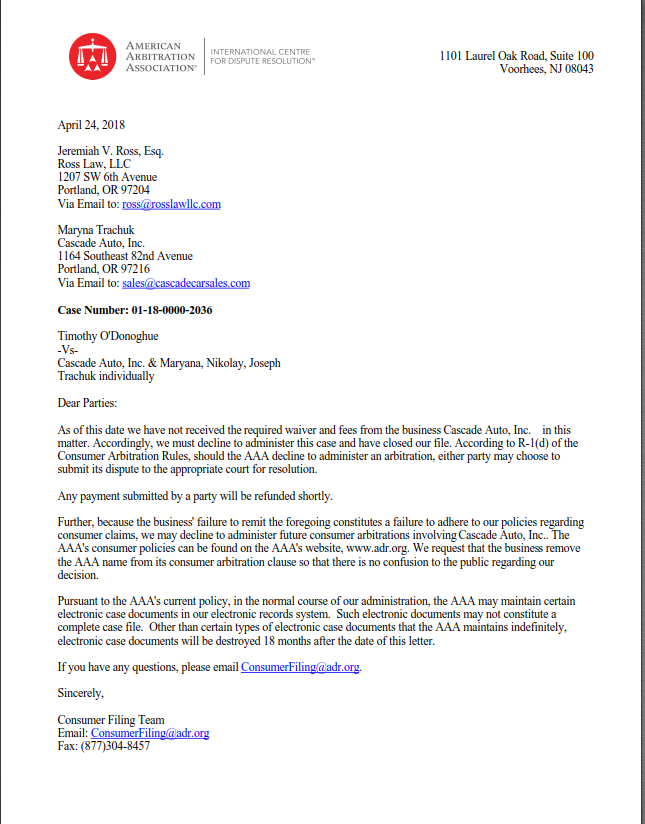Days, weeks, or months later, the dealership calls the consumer and tells the consumer that the financing did not go through. The dealership will then claim they can obtain financing for the vehicle, but they will either need more money for a down payment, or they have to change the financing terms, or both. This puts the consumer in a difficult spot, because the consumer is under the impression the vehicle was theirs. Consumers don’t want to have to explain to friends and family that they had to return the vehicle because they couldn’t get it financed. Dealers know this, and capitalize on the consumer’s fears to get the consumer to agree to new less favorable financing terms. This allows the dealership to squeeze more money out of the consumer.
Yo-Yo sales are legal. However, the law requires the dealership to comply with certain deadlines and make certain disclosures in order to make a Yo-Yo sale legal. For example, the dealership has 14 days from the date the consumer takes possession of the vehicle to find the consumer financing or inform the consumer that financing under the original terms could not be obtained. During this 14-day period the dealership cannot sell the Trade-In vehicle. Additionally, if the dealership cannot obtain vehicle financing under the original terms, then the dealership must offer to immediately return any vehicle traded in and any cash down payment. If the dealership fails to do this, they have broken the law.
Usually there are other legal violations that flow out of these unlawful sales. Truth In Lending Act violations are common, unlawful “payment packing” is also common, and there will often be unlawful attempts to conceal negative equity or inflate cash down payments in an effort to obtain financing from the lender. This is what we allege Ontario Auto Ranch has done.
Ontario Auto Ranch is a large auto dealership in Ontario, Oregon. Auto Ranch sold our client a 2015 Ford truck in June 2018. Auto Ranch orchestrated the deal so that our client would trade in two vehicles for the Ford truck, and the dealership would obtain financing for the Ford Truck. Our client took possession of the vehicle in June 2018 and the dealership informed our client the financing had been approved. At that time, the dealership took possession of the 2 trade in vehicles.
One of the trade-ins was a 2017 Dodge truck, the other was an 2011 Ford. The Dodge was financed and the consumer owed more than the Dodge was worth. (negative equity) The financing documents do not note the Dodge had any negative equity, so it appears that the dealership gave our client cash for the 2011 Ford and applied that amount to the “Trade-In value” of the Dodge. The financing documents are silent on the amount the dealer paid our client for the 2011 Ford. This allowed the dealership to conceal the Dodge’s negative equity and make it appear the dealership paid more for the Dodge than they actually did.
The Retail Installment Contract was also silent as to “Theft Protection” and “Pre-Paid Maintenance.” Dealerships make significant profits on these additional products. However, these products appear on our client’s “Motor Vehicle Purchase Agreement.” It appears these products were unlawfully rolled into the purchase price of the vehicle, and were not disclosed in accordance with the law.
After the purchase of the Ford Truck, our client continued to contact Ontario Auto Ranch. He wanted to know where he would send his monthly payments to. Ontario Auto Ranch informed him that the vehicle financing was being processed and blamed the delay on the Credit Union.
Six weeks after our client took possession of the vehicle, Ontario Auto Ranch finally informed our client that they were having difficulty financing the vehicle due to a paperwork error. In August 2018, the dealership demanded our client sign a new Retail Installment Contract with new financing terms. Auto Ranch again failed to disclose the Dodge’s negative equity and there is no mention of the 2011 Ford on the August Retail Installment Contract. However, this time the dealership noted on the Retail Installment Contract that there was $299.00 paid to an entity for “Maintenance.” Similar to the June 2018 sale, our client was instructed where to sign and did so based on the dealer’s representations.
Our client continued to call Auto Ranch in August and September 2018. At this point, our client had the vehicle for roughly three months. However, Ontario Auto Ranch gave him the run-around and would not provide a clear answer on the status of the financing. In September, Ontario Auto Ranch asserted the loan needed to be re-submitted to the bank.
Later in September, the dealership informed our client that it was unable to obtain funding for the Ford’s loan under the terms of the agreement. Auto Ranch informed our client that a different bank could finance the deal, but at a substantially higher interest rate. Shortly thereafter, Auto Ranch informed our client that the options were: 1) sign a new financing contract with a higher interest rate, or 2) Auto Ranch would repossess the Ford. Auto Ranch never informed our client whether or not he could obtain his trade-ins back. In October 2018, our client contacted Ontario Auto Ranch in an effort to determine the status of financing. The dealership has yet to get back to him or contact Ross Law.
As a result, our client had no choice but to file a lawsuit against the dealership. This type of scam is all too common. However, it rarely gets to this point. As you can imagine this has been extremely frustrating and difficult for our client. We are eager to force the dealership to attempt to justify their actions and hopefully Auto Ranch will learn from this lawsuit.
FOR A FULL FACTUAL BASIS FOR THIS POST SEE: Malheur County Circuit Court Case 18CV55364. If you, or someone you know, has been ripped off by a car dealers, call Ross Law PDX at 503.224.1658. Jeremiah Ross represents consumers throughout the state of Oregon. Please note that this litigation is evolving and refer to the Court’s file for updated information, and this post is based on current information as we know it. The dealership may have a different version of events, and we look forward to hearing those.










